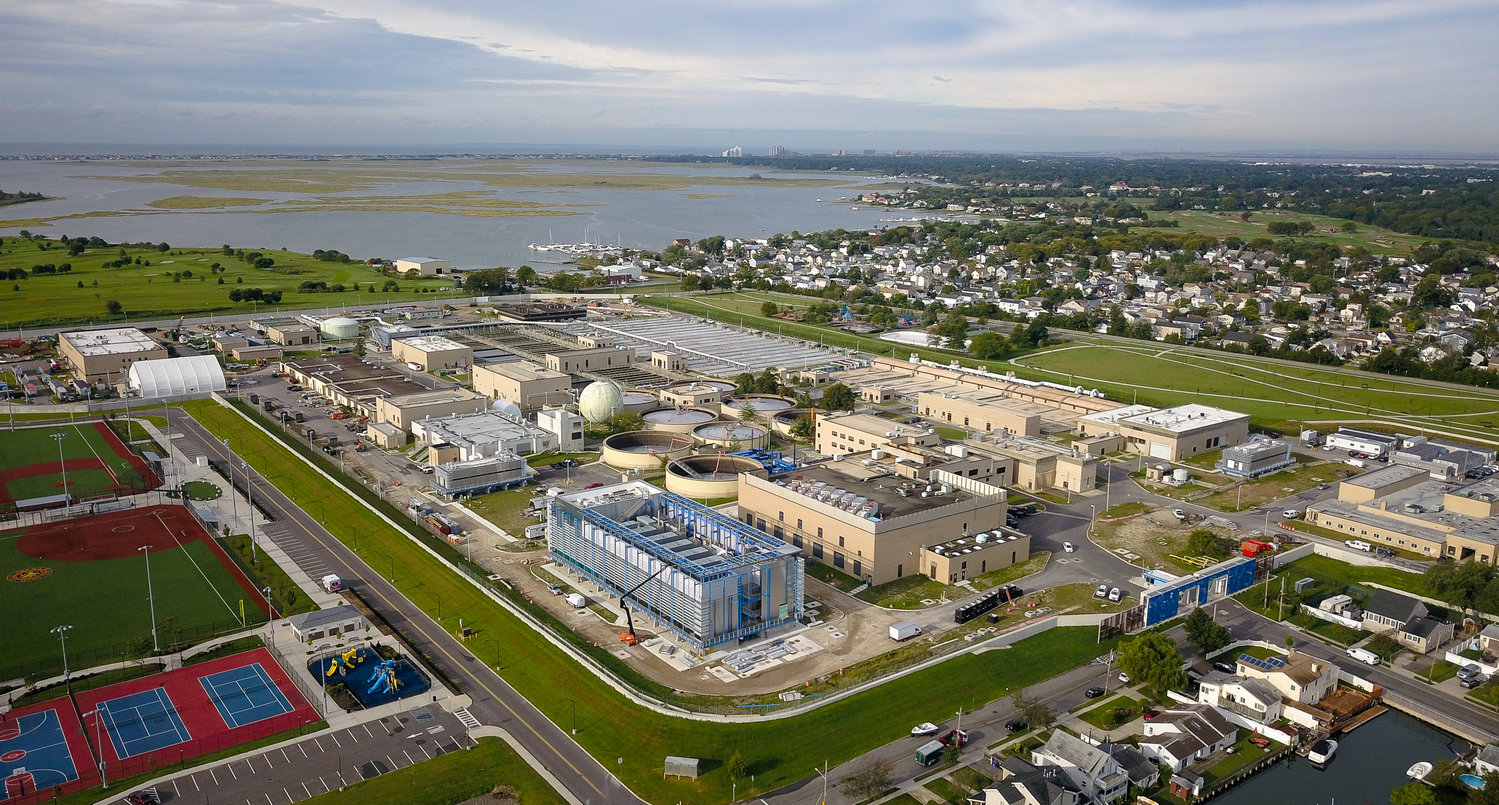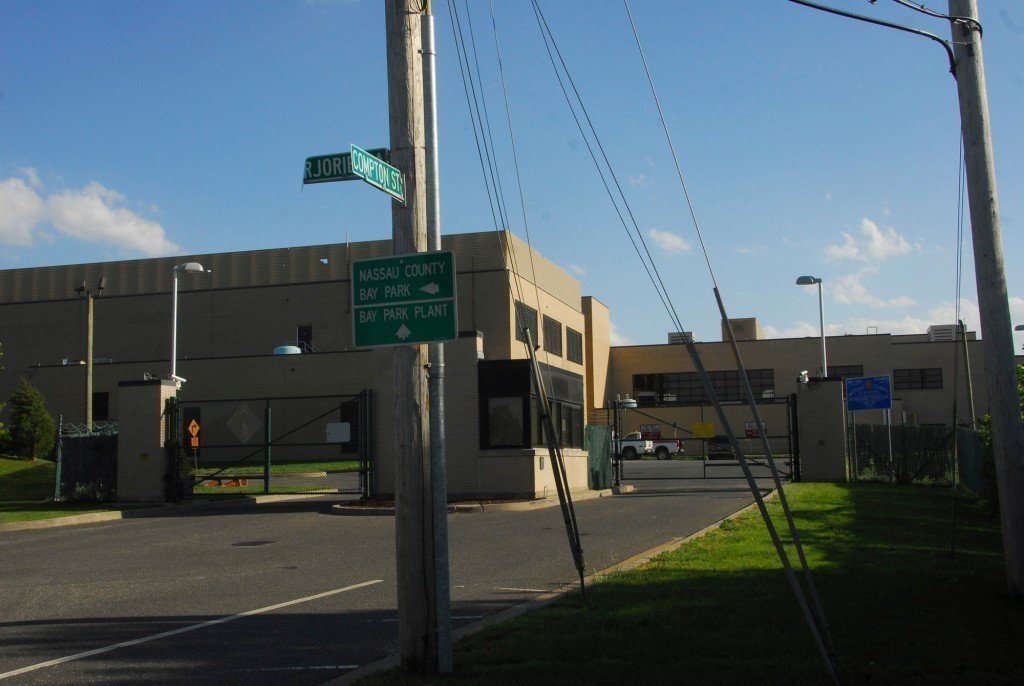Diesel exhaust is concern at Bay Park Water Reclamation Facility
When the power generators are running on diesel fuel at the Bay Park Water Reclamation Facility at times each day, a plume of yellow smoke can be seen spewing from the plant, filling the air in nearby yards and parks with odors and toxins. That has residents worried about the potential health effects of inhaling diesel exhaust.
Residents voiced their concerns at a community forum hosted by Suez Water Long Island — which manages the facility under the Nassau County Department of Public Works — on Sept. 25.
In June 2012, the International Agency for Research on Cancer, part of the World Health Organization, classified diesel exhaust as a Group One carcinogen, meaning that it causes cancer in humans.
“When it’s running on diesel and you’re downwind from it, you don’t want to be there,” resident John Kenny said of the Bay Park plant. “We know that we have to deal with a sewage plant, but what are they doing for us? . . . If they’re not going to address the local concerns, they’re falling short for us.”
Alan Weland, general manager and vice president of Suez Water Long Island, led the forum, which was attended by about a dozen residents and elected officials, to gather community input. A new sewage distribution system is under construction at the plant, Weland said, and as the plant converts to the new system, it runs less often on natural gas than on diesel fuel, which releases greater amounts of contaminants into the air. The plant, Weland said, would rely less on diesel once the new system is operational, sometime between January and March.
“We’ll still go on diesel, but it won’t be as frequent as we’re seeing right now,” he explained. “It’s just because of this project.”
There are eight generators at the plant, Weland said, that can run on natural gas or diesel. He added that the plant operators have attempted to burn as little diesel as possible, and that the plant’s generators were rebuilt in 2016 with the goal of running on diesel less often.
The Bay Park plant has undergone several storm-hardening projects after Hurricane Sandy, which severely damaged it. The storm caused the facility to go offline and nearly 100 million gallons of untreated sewage to flow into Hewlett Harbor and nearby homes. The $830 million upgrades included a flood barrier system for the facility and raised unit substations for added resiliency, as well as parkland improvements.
The Bay Park plant, built in 1941, serves 500,000 residents, and discharges an average of 52 million gallons of treated effluent into Reynolds Channel per day. To process each load, Weland said, the plant must operate on diesel for 15 to 20 minutes before switching to natural gas.
According to Weland, Suez must obey an air code overseen by the state’s Department of Environmental Conservation, regulating the amount of pollutants that are discharged from the facility. The code also caps the amount of time the plant can run on diesel fuel. Suez monitors the air and produces a daily report into a database from the readings it receives, and sends the results to the DEC every six months through a third-party engineering firm, Weland said.
But several residents at the meeting expressed concerns about the unknown hazards of breathing the air near the plant when it is running on diesel. A few community members took issue with yellow smoke billowing from the stacks outside the plant daily, while others said their children are breathing in pollutants outside their homes or at the athletic facilities across the street from the plant.
Kenny said that people playing with their children in the park or a round of golf near the facility notice the odors but do not know what they are breathing. “You would be hard-pressed to say it would be an enjoyable experience, because you’re dealing with heavy particulates,” he said. “This is stuff that has been shown to damage your heart, damage your lungs.”
Nearby resident Alex Predrone said he was worried about the health effects of the plant’s emissions, and noted that the foul odor can be overpowering. A few residents asked whether better filters could be installed at the plant to ensure that the air is cleaner and safe to breathe, but Weland said that decision would be up to the DPW, which was not represented at the meeting.
County Legislator Denise Ford, a Republican from Long Beach, and State Assemblywoman Melissa Miller, a Republican from Atlantic Beach, attended the forum and questioned why the DPW was not there.
“This is a community forum that needs to have some of these questions answered,” Ford said. “It probably would have been to their benefit as well to have had somebody from DPW here so that they can explain whether or not any type of filter or screen could be placed over where the diesel comes out.”
Weland said he invited the DPW, but a representative had to cancel at the last minute. He added that he would work with DPW officials to host a future forum at which all concerns could be addressed, but he did not specify a date. He said Suez would also issue warnings to nearby homes when the plant is running on diesel in the future. Many residents also said that hosting the forum on a Wednesday afternoon with little notice reduced turnout.
The DPW did not return a call requesting comment at press time.
Miller said that despite the plant being DEC-compliant, she was worried about the toxins that residents are breathing in. “Just because something isn’t exceeding a cap or a limit doesn’t necessarily make it safe long-term to be inhaling and breathing in,” she said, “especially for young, developing brains.”









